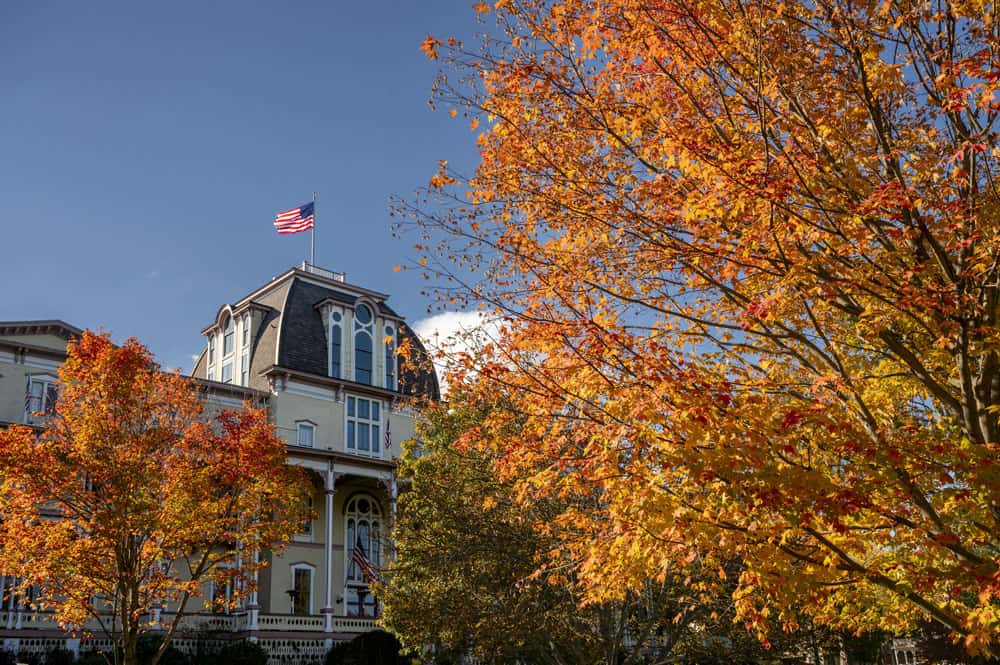Welcome to the fall update on Chautauqua’s Climate Change Initiative (CCI). I hope that many of you were able to visit the Institution in October. The colors were stunning!
In this edition we provide a wrap-up of the 2023 Summer Assembly, review important progress in making the Institution more environmentally sustainable, and share some exciting updates about our ongoing investments in understanding and improving Chautauqua Lake’s ecological health.
We regularly post program updates by email and online at climate.chq.org. In addition, our Chautauquans for Sustainability group on Facebook now has 273 members. Please join us if you are a Facebook user.
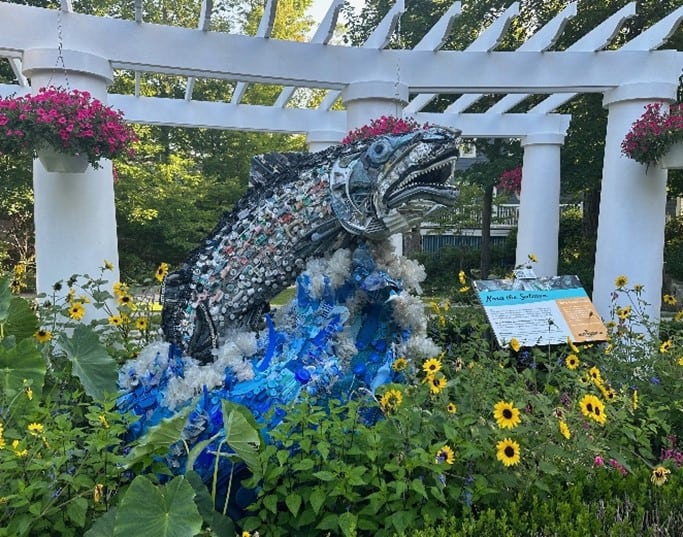
“Washed Ashore — Art to Save the Sea,” an installation of 14 sculptures made from washed-up beach plastic, concluded its run at Chautauqua on Oct. 31. This hugely popular exhibit delighted visitors while drawing attention to the serious problem of plastics in our environment. Throughout the season we featured films, lectures and tours focused on the plastics problem and solutions. While we’ll miss our animal friends, we’re excited to announce that Chautauqua has commissioned a permanent “Washed Ashore” sculpture for our grounds! More details are coming this winter.
Mark Wenzler
Peter Nosler Director of the Chautauqua Climate Change Initiative
mwenzler@chq.org | c: 202-255-9013
Programs
2023 Season in Review
We kicked off our 2023 season with the third annual Chautauqua Lake Science Conference on June 17. Eight speakers shared their expertise on topics like algae, Chautauqua Lake’s importance in the region, and the community’s involvement in lake health and ecology. Chautauqua Institution President Michael E. Hill discussed the Institution’s $5 million investment in lake research, including The Jefferson Project at Chautauqua Lake, and we heard from The Jefferson Project’s lead researchers. You can read more in The Chautauquan Daily and use this link to view the presentations.
The Institution delivered an impressive 65 unique programs focused on climate change, sustainability, the environment and nature over the nine-week Summer Assembly. We explored multiple dimensions of the climate issue, including science, art, literature, film, music, policy and faith. The season included some blockbuster talks on our main stages, especially during Week Seven’s focus on the National Parks, which featured Connor Knighton of “CBS Sunday Mornings,” Kevin Fedarko and Pete McBride of National Geographic, Rue Mapp of Outdoor Afro and author Dipesh Chakrabarty.
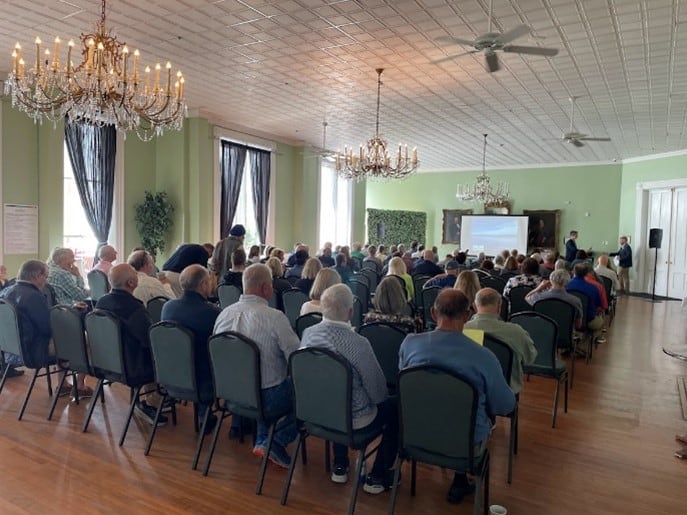
65 Programs
7
Chautauqua Lecture Series presentations
2
Chautauqua Literary Arts/CLSC lectures
6
Chautauqua Interfaith Lectures
4
Bird, Tree & Garden Club Brown Bags
6
Chautauqua Science Group talks
8
Special Studies programs
7
Chautauqua Cinema programs
10
Special climate programs
15
Community tabling events
Perhaps most impactful were the many programs that occurred away from the main stages, particularly in our collaborations with the Bird, Tree & Garden Club, the Chautauqua Science Group and the Chautauqua Cinema. The Cinema proved to be an especially popular venue, with environmental films and filmmakers drawing record crowds throughout the summer. A key takeaway from the 2023 season is that our greatest impact occurs when we partner with the broader Chautauqua community who bring so much energy, creativity and enthusiasm to addressing climate change and sustainability.
For more details on the 2023 Summer Assembly climate programs, please see the Chautauqua Climate Change Initiative Spring 2023 update. You can also read articles on many of the summer climate programs by Mariia Novoselia, the wonderful environmental reporter at the Daily.
Plastics Reduction Initiative
Plastic pollution in our oceans, in our food and in our bodies has become one of the most worrisome environmental problems of our time. Globally we are producing over 380 million tons of plastic every year. Up to 50% of that is for single-use purposes—utilized for just a few moments, but on the planet for hundreds of years. “Washed Ashore — Art to Save the Sea” brought attention to the problem with 14 stunning sculptures located across Chautauqua’s grounds. To ensure the exhibit has a lasting impact, we invested in helping the Institution move beyond single-use plastics and delivered relevant educational programs throughout the season.
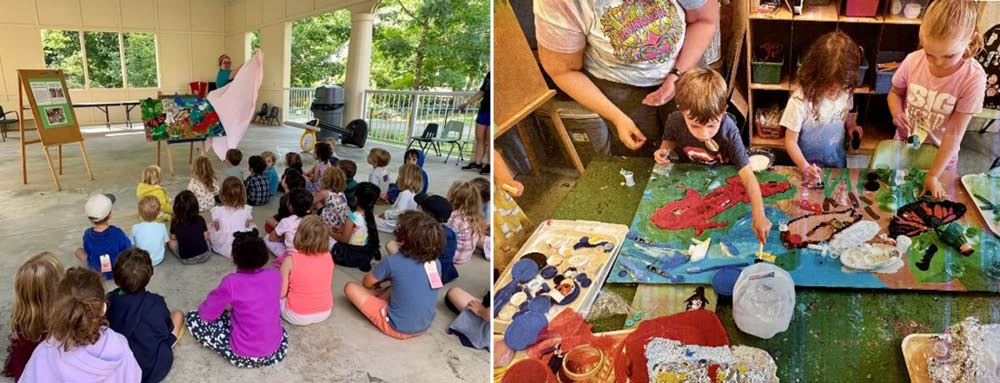
Here are some of the highlights:
- Chautauqua installed three new water bottle refill stations for the 2023 Summer Assembly, for a total of 10 stations located throughout the grounds.
- The Chautauqua Hotel Corporation switched from single-use plastic to aluminum water bottles in many venues, and to bamboo cutlery for takeout meals.
- Two of America’s leading plastic pollution researchers delivered talks at Chautauqua in the 2023 season: Sherri “Sam” Mason of Penn State and Marcus Erikson, founder of the 5 Gyres institute.
- We showed three films documenting the plastics pollution problem and highlighting solutions, followed by talks from the filmmakers: “Plastic Earth” by Janice Overbeck, and “Junk Raft” and “Smog of the Sea,” by Marcus Erikson.
- Field trips for Chautauqua County schools in the spring and fall included educational programming related to the “Washed Ashore” exhibit and plastics in our environment.
- Washed Ashore Executive Director Katie Dougherty and Conservation Director Brad Parks delivered talks about plastics in our ocean and how Washed Ashore is helping advance solutions.
- Chautauqua Children’s School engaged with the “Washed Ashore” exhibition all summer and were so inspired they created their own artwork from discarded plastic!
Twice a week during the 2023 Summer Assembly, the Climate Change Initiative had a table on Bestor Plaza where we engaged visitors in conversations about alternatives to single-use plastic products. Our table included sample reusable products and educational materials. Our terrific summer interns Cristina Jackson and John Watters facilitated over 800 visitors signing a plastics reduction pledge and gave away 1,500 reusable water bottles made entirely from plants! Thank you, Chautauquans, for doing your part to reduce single-use plastics in our environment.
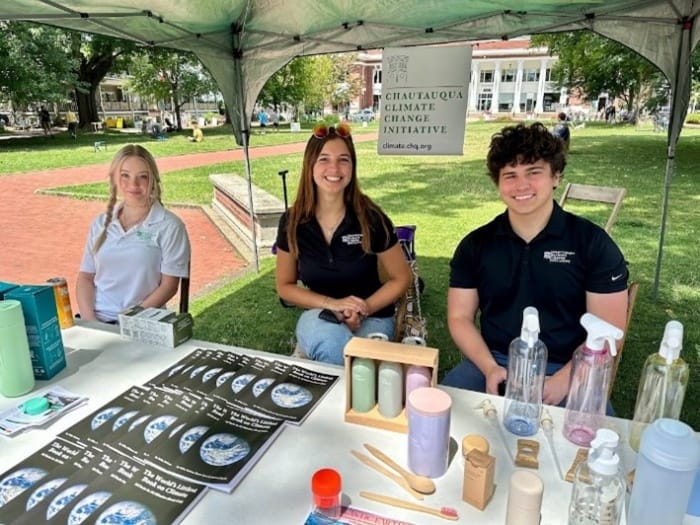
Chautauqua Travels Iceland
In early October, an intrepid group of 18 Chautauquans traveled to Iceland for Clean Energy and a Changing Climate in Iceland — after first visiting the country in July 2021. Iceland, which gets nearly 100% of its energy from non-carbon, renewable resources, is hosting one of the most exciting climate experiments happening anywhere in the world, one that is seeking to establish the potential to literally suck carbon dioxide out of the air and turn it into rock. Our group spent time learning how Iceland’s geology and geography make this small island nation uniquely suited to pioneer cutting-edge climate solutions. We also learned how Iceland, like every other nation, is grappling with the consequences of a warming planet, from melting glaciers to vanishing wildlife.
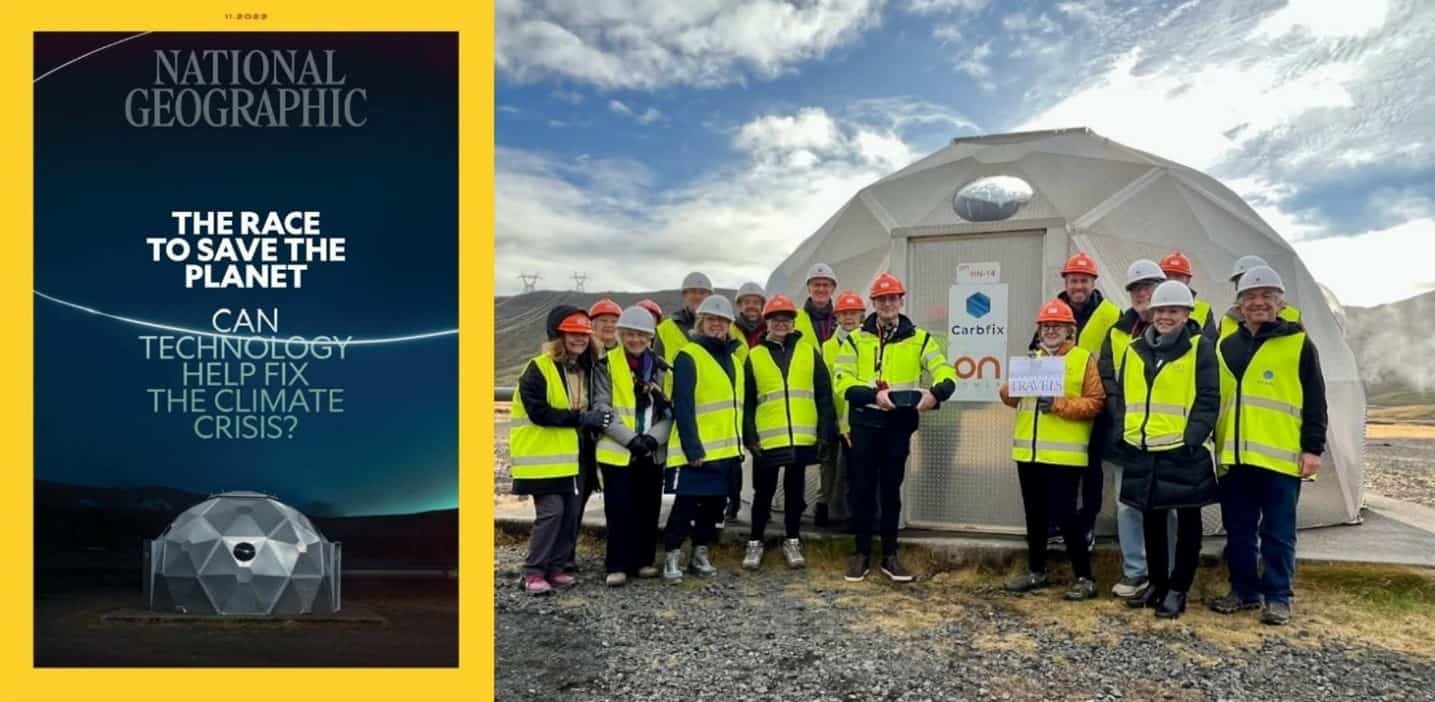
Scientists, journalists and policymakers the world over are flocking to Iceland to learn about how direct air capture and geologic sequestration of carbon dioxide might someday help meaningfully reduce excess greenhouse gasses in our atmosphere. Days after returning from Iceland, we were surprised and delighted to see the facility we had just visited on the cover of the National Geographic November 2023 edition. While the CarbFix technology is still a long way from solving the climate crisis, we were encouraged to learn that early successes have led to a planned tenfold expansion of the Iceland facility.
We concluded our visit with a discussion on how to bring our newfound climate knowledge home to help make Chautauqua, New York State, and our country more environmentally sustainable. Chautauqua Travels is a wonderful way to extend your learning journey beyond the Summer Assembly. I hope you can join us on a future adventure.
Chautauqua Lake
We’ve had a great year for research and for expanding our capacity for understanding the ecological challenges facing Chautauqua Lake. We’ve continued our work with the Jefferson Project, a research collaborative between Rensselaer Polytechnic Institute and IBM Research that started with Lake George, New York, while also deepening coordination with SUNY Fredonia and Chautauqua County. Thanks to Chautauqua Lake Project Manager Toby Shepherd for the updates that follow.
Lake Research and Jefferson Project
The Jefferson Project’s second-generation vertical profilers were installed in the north and south basins of Chautauqua Lake in mid-July. You can read more about The Jefferson Project’s 2023 deployment of vertical profilers in The Chautauquan Daily.

The two vertical profilers are still in the lake collecting data. They will be removed prior to Thanksgiving, which is about as long as we can possibly leave them in and still recover them safely before winter sets in. The Jefferson Project has collected a significant amount of useful data from the profilers, and we look forward to sharing their most recent findings soon.
The Jefferson Project completed its physical lake sampling season on Halloween. The program included 18 sites throughout both lake basins, tested biweekly for nutrient content, water clarity, total suspended solids and genomic samples for future study.
Research results to date: The Jefferson Project shared results from its physical sampling program and vertical profiler data at the June 2023 Chautauqua Lake Science Conference. You can download and read their presentation — then download and review additional research findings by Courtney Wigdahl-Perry of SUNY Fredonia.
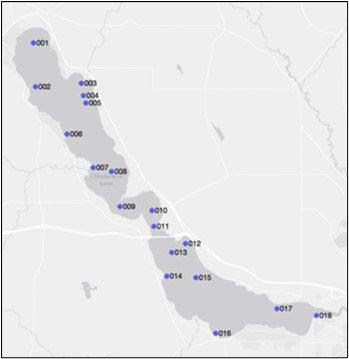
Algal Survey: Allison Hrycik, a phycologist (one who studies algae) working with The Jefferson Project, conducted a survey this year to help us better understand how algae forms in Chautauqua Lake. Dr. Hrycik deployed algae collection tiles at 11 docks around the lake between June 1 and Aug. 31. The results are currently being analyzed.
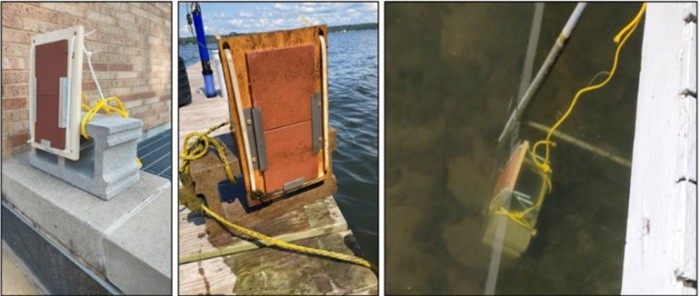
Tributary Monitoring Stations: The Institution worked with The Jefferson Project to design and site six tributary monitoring stations on different creeks, and one water flow station on the Chadakoin River this year. We have contracted Timberhut, a manufacturing company from Great Valley, New York, to build the stations and expect they will complete their work by Nov. 30, 2023. Once fully operational, these stations will provide researchers with a continuous stream of data, telling the story of what enters the lake from parts of its watershed. We believe that this data will significantly advance our understanding of harmful algal blooms and other environmental issues.
Research Boat: Chautauqua County used funds from the American Rescue Plan Act to purchase a research boat for taking water samples from Chautauqua Lake. The county has entered into a licensing agreement with the Institution, allowing us to use this boat in support of Jefferson Project research. We expect to receive the boat later this fall. The boat will be a huge help in deploying, recovering and maintaining the vertical profilers, and continuing the lake sampling program. Until now, the Institution has been borrowing boats when available, or renting as needed to accomplish these objectives. Having a dedicated, properly sized boat will provide a safe, reliable vehicle for lake research for many years into the future.
Operations
Electric Vehicle Chargers
Chautauquans with electric vehicles (EV) were delighted to arrive for the 2023 Summer Assembly and find six new electric vehicle chargers, joining four preexisting chargers. This major expansion of EV charging capacity was made possible through the generosity of two partners, Tesla NY Gigafactory in Buffalo and National Grid, Chautauqua’s electric utility company. The North lot now includes two new stations with four plugs, two with standard plugs and two with Tesla chargers. The South lot now includes two new standard plugs. Tesla donated the chargers and National Grid’s EV Make-Ready Program covered 90% of the installation costs. You can read more about the new EV charges in our joint press release with National Grid.
As exemplified by our EV charger project, making Chautauqua more sustainable relies on partnerships across the western New York State region. Our electricity, transportation, waste, and other operations are integrated with our surrounding region, and so it makes sense we think about the sustainability of Chautauqua not in isolation, but in collaboration with our neighbors.
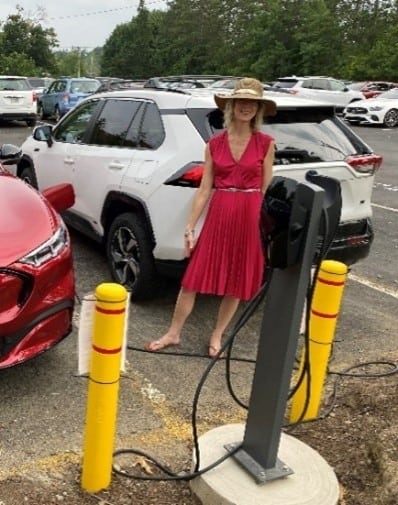
Retool Western New York
An example of this type of cross-regional collaboration is our partnership with the Jamestown Board of Public Utilities in their Retool WNY initiative that seeks to grow a green regional economy. Chautauqua and Jamestown BPU hosted the second Retool WNY conference on the grounds of the Institution on July 25, 2023. The conference featured speakers from across western New York, including executives of major regional manufacturers and job training centers. Chautauqua is proud to partner with our western New York neighbors to reimagine our region as a leader in addressing climate change and sustainability. You can read more about the conference in The Chautauquan Daily.
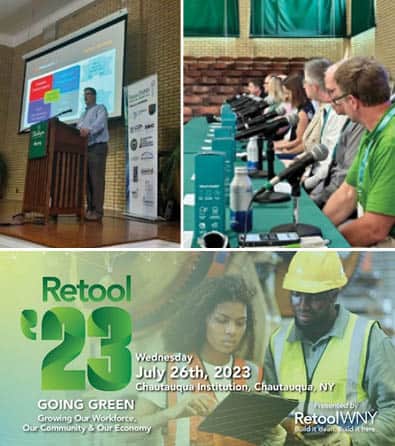
Sustainable Operations
Chautauqua Institution is committed to practicing responsible environmental stewardship. We strive to continually improve the sustainability of our operations through waste reduction, energy conservation and environmental management practices. Read more about Chautauqua’s sustainable operations and key focal areas.
The installation of three new water bottle refill stations this past summer shows how we are helping our community make more sustainable choices — in this case reducing the need for visitors to purchase single-use water bottles. We acknowledge and appreciate the partnership and support of the Chautauqua Property Owners Association and Institution donors in helping make the Institution and our grounds a model of environmental stewardship.
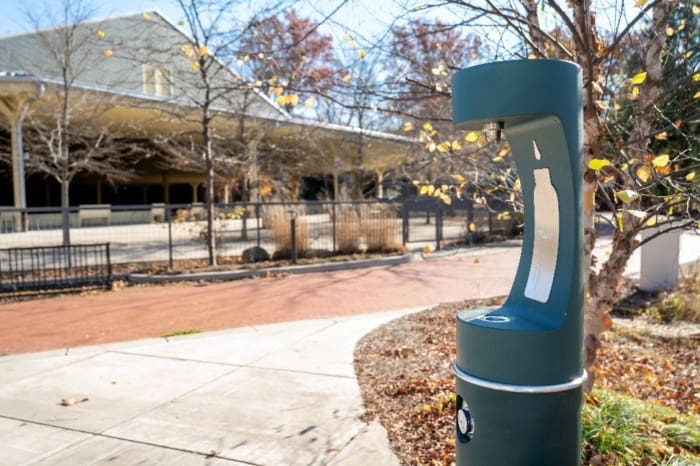
In Memoriam: Peter Nosler
As we prepared to send this update we learned of the passing of Peter Nosler, a remarkable business leader, philanthropist and friend. Inspired by a talk that Bill McKibben gave at Chautauqua in 2019, Peter became a champion for addressing climate change. Along with philanthropist Jane Batten, Peter and his wife Julie Veitch enabled us to establish the Chautauqua Climate Change Initiative (CCI) in 2021.
Last year, Peter’s family matched a second donation by the Batten family to create a permanent endowment for the CCI, resulting in the naming of the Peter Nosler Director of the Chautauqua Climate Change Initiative. Peter and Julie, along with their dear friends Bestor Cram and Penny Hauser, and Louise and Tim Hartman, deeply loved Chautauqua and visited for several weeks each summer. Peter endlessly inspired us, and gently challenged us, to dream big as we built CCI. His creativity, generosity, kindness, and dedication to lifelong learning will forever shape CCI. Please take some time to read about Peter’s remarkable life.
We will miss you dearly, Peter.
Save Your Trip
Fill out the form below to save your trip. You will receive a link to your saved list via email.
Save Your Favorites
Fill out the form below to save your favorites. You will receive a link to your favorites list via email.
"*" indicates required fields
Notice!
You have now entered the season. Some website content may differ depending on the current season we are in: Summer or Fall/Winter/Spring. You can toggle between the two season options at any time.
